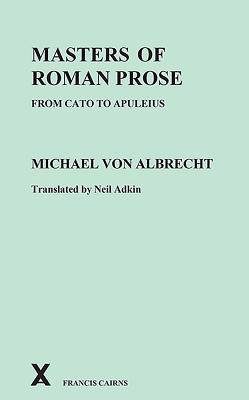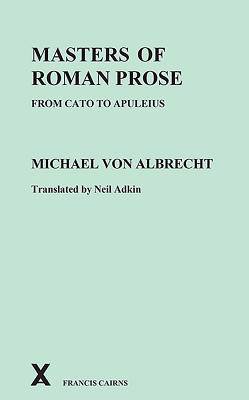
- Afhalen na 1 uur in een winkel met voorraad
- Gratis thuislevering in België vanaf € 30
- Ruim aanbod met 7 miljoen producten
- Afhalen na 1 uur in een winkel met voorraad
- Gratis thuislevering in België vanaf € 30
- Ruim aanbod met 7 miljoen producten
Zoeken
Omschrijving
In this commented anthology of Latin prose, Michael von Albrecht selects texts from a span of Roman literature covering four centuries. A summary of the contents will indicate its range and variety: M. Porcius Cato (the preface to De agricultura, a passage from the speech for the Rhodians of 167 B.C., and a section from the Origines ); republican oratory (C. Gracchus, from De legibus promulgatis of 122 B.C. and Cicero from In Verrem II ); Caesar as orator and historian; two passages of Sallust; a comparison of Claudius Quadrigarius and Livy as historiographers; philosophical texts from Cicero and the Younger Seneca; and chapters on Petronius, Tacitus, Pliny the Younger, and Apuleius. The method of the book is practical, based on actual interpretation of specific texts rather than on literary theory (ancient or modern). Each text (printed first in Latin and then in English) is followed by a detailed and flexible discussion, somewhere between essay and commentary. No set pattern is imposed - rather the nature of the text governs the shape of its analysis - but Professor von Albrecht's vivid scholarly exposition covers most dimensions of the art of Latin prose-writing. The book's variety of texts and close treatment of specific Latin passages make it an ideal coursebook for the study of Latin prose. But behind its accessibility lies scholarship of the highest order: Professor von Albrecht's exemplary erudition reveals itself in the extensive annotation underpinning his main text; and researchers in any of the fields covered by Latin prose-writers - philosophy, politics, history, letters, practical handbooks, entertainment - will find this book a valuable resource. This book was originally published in German ( Meister römischer Prosa von Cato bis Apuleius, 1971). It has been accurately and sympathetically translated by Neil Adkin.
Specificaties
Betrokkenen
- Auteur(s):
- Uitgeverij:
Inhoud
- Aantal bladzijden:
- 192
- Taal:
- Engels
- Reeks:
Eigenschappen
- Productcode (EAN):
- 9780995461208
- Verschijningsdatum:
- 30/11/2016
- Uitvoering:
- Paperback
- Formaat:
- Trade paperback (VS)
- Afmetingen:
- 137 mm x 213 mm
- Gewicht:
- 272 g

Alleen bij Standaard Boekhandel
+ 117 punten op je klantenkaart van Standaard Boekhandel
Beoordelingen
We publiceren alleen reviews die voldoen aan de voorwaarden voor reviews. Bekijk onze voorwaarden voor reviews.











